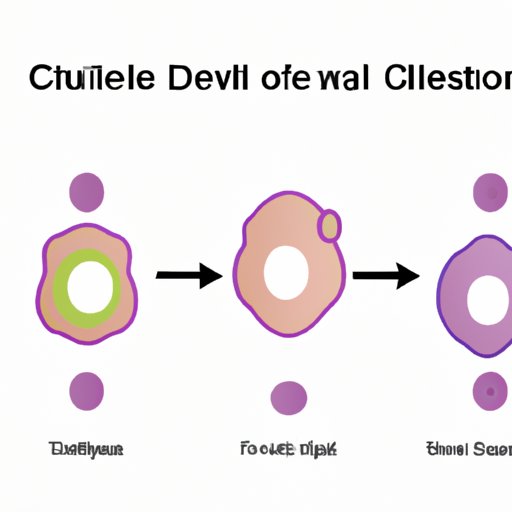Introduction
Cell division is a crucial process in the functioning of living organisms. It is the process through which cells divide to form new cells, therefore promoting the growth and development of organisms. Cell division is essential for various aspects of life, including healing, reproduction, and evolution. In this article, we will explore the different ways in which cell division plays a significant role in daily life.
The Building Blocks of Life: Exploring the Necessity of Cell Division for Organism Growth and Development
Cell division is the process through which a single cell divides and produces two or more daughter cells. This process is necessary for the growth and development of living organisms. Cells divide to replace damaged or old cells, allowing the organism to grow and develop. Without cell division, organisms would not be able to reproduce or repair damaged tissues.
Cell differentiation and specialization also rely on cell division. As cells divide, they differentiate into different cell types, which perform specific functions in the body. This process is necessary for the formation of complex structures such as organs. Without cell differentiation, cells would not be specialized enough to perform specific functions.
Dividing to Conquer: Understanding the Significance of Cell Division in the Body’s Healing Process
The healing process in the body relies heavily on cell division. When an injury occurs, the body responds by initiating a healing process that involves the production of new cells. Different types of cells such as leukocytes and fibroblasts are involved in the healing process. Leukocytes are involved in fighting off infections that can occur during the healing process, while fibroblasts are involved in producing connective tissue to promote healing.
The timing and coordination of cell division are critical in the healing process. If cell division is not coordinated correctly, scars may form, and the healing process may be incomplete. This can lead to long-term tissue damage and chronic pain.
The Cycle of Life: How Cell Division Plays a Crucial Role in Reproduction and Evolution
Cell division is essential in both asexual and sexual reproduction. In asexual reproduction, cell division allows organisms to clone themselves without the need for fertilization. In sexual reproduction, cell division plays a crucial role in the formation of gametes, which are necessary for fertilization. The genetic diversity that is essential in sexual reproduction is achieved through cell division and genetic recombination.
Cell division is also responsible for genetic diversity and evolution. Mutations can occur during cell division, leading to genetic diversity. Over time, genetic diversity can result in the formation of new species and biological diversity.
From One to Many: Examining the Importance of Cell Division in Multicellular Organisms
Cell division is vital for the growth and development of multicellular organisms. Different types of cell division are involved in the formation of different tissues such as epithelial, connective, and muscle tissue. Specialized cell division such as meiosis is involved in the formation of gametes, while mitosis is involved in the growth and repair of tissues.
In multicellular organisms, cell division also plays a significant role in the maintenance and repair of tissues. Damaged cells are replaced by new cells through the process of cell division, preventing tissue damage and diseases.
The Importance of Checkpoints: Highlighting the Role of Cell Division in Preventing Cancer and Other Diseases
Cell cycle checkpoints are critical in preventing cell division errors that can lead to diseases such as cancer. These checkpoints determine if the cell is ready for the next stage of the cell cycle or if it needs to be repaired or destroyed. If a cell receives a signal that it is not ready for division, the cell cycle is halted, allowing time for the cell to undergo DNA repair before attempting cell division.
Errors in cell division can lead to mutations and chromosomal abnormalities, which can cause diseases such as cancer. The regulation of the cell cycle is crucial in preventing these errors from occurring.
Small but Mighty: Why Cell Division is Vital for Tissue Repair and Maintenance
Cell division is responsible for the maintenance and renewal of different types of tissues. This process allows for the renewal of damaged or old tissues, preventing the buildup of damaged cells that can lead to diseases such as cancer.
Factors such as age, lifestyle, and environmental factors can impact tissue repair and cell division. A healthy lifestyle, including a balanced diet and exercise, can promote healthy cell division, contributing to overall health and well-being.
Conclusion
Cell division is a vital process in the functioning of living organisms. It contributes to the growth, development, and healing of organisms, as well as genetic diversity and evolution. The regulation of the cell cycle is essential in preventing diseases such as cancer, and a healthy lifestyle can promote healthy cell division. As we continue to explore the significance of cell division, we can better understand its impact on various aspects of daily life.
Recommended further readings on the topic include “The Cell Cycle and Cancer” by Robert A. Weinberg and “Cell Division and Growth of Cancer Cells: A Pathway to Understanding Tumor Development and Treatment” by Richard A. Larson and Karen K. Effinger.
